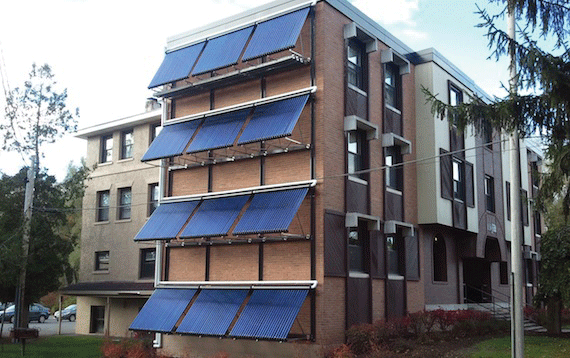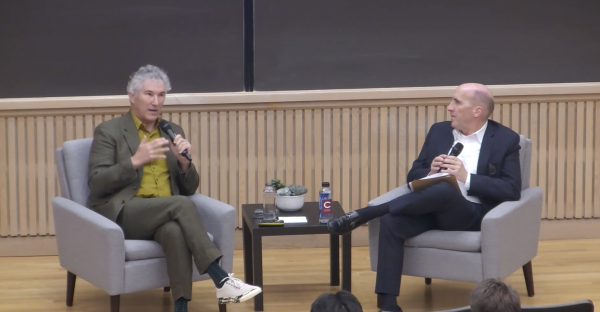Faculty Panel Discusses Environmental Activism and Climate Change

Professors discuss carbon neutrality at Colgate. Pictured above are solar panels at the Creative Arts House on Broad Street.
The Environmental Studies Program hosted a brown bag panel discussion on February 3 titled “Sustainability, Policy and Activism under the Trump Administration.” Panelists included Director of Sustainability John Pumilio, Biology and Environmental Studies Professor Catherine Cardelus and Environmental Studies Professor Andrew Pattison, who spoke to students about methods of environmental activism under an administration that has signaled it will ignore the scientific proof of climate change.
The panelists first shared stories of their personal entry into various scientific disciplines, explained the work that they currently do in their respective specialties and offered their suggestions for environmental activism at Colgate.
Cardelus, who studies the decline of forests all over the world, has recently been studying the last remaining forests in northern Ethiopia. Her drive to work, she explained, is motivated by a desire to share her enthusiasm with her students, who can benefit from her guidance.
“I get up in the morning because I love teaching students who I think are going to get us out of this [difficult situation],” Cardelus said.
Senior Kate Bazany attended the brown bag to learn what the speakers had to say about concrete steps that can be taken to create environmentally-friendly policy or to offset the effects of policies that negatively impact the environment. Bazany studies Ethiopian forests with Professor Cardelus, and remarked that hearing how motivated the panelists were about their work inspired her.
“I think it’s good to have talks like this so that people can come into this space and realize that there are steps of action that can be taken, even when it seems like there might not be a whole lot of hope,” Bazany said. “It’s good that these talks can give a little hope, and a little realism.”
Pattison’s career, jumpstarted by winning a town council election at the age of fourteen, has been a blend of science and policy. He suggested that the best method for change requires individuals to tap into their personal areas of specialty and to get involved in local politics.
“The vast majority of the laws that affect you happen at the local level,” Pattison said. “If you don’t feel like working on a climate plan, you should, at least once in your young lives, volunteer for a political campaign. There’s nothing that will serve you better as a person than being able to knock on the door of a stranger and be able to ask them for their support for something that you believe in.”
Pumilio and Cardelus both advocated for many small actions that can be taken by individuals, such as students deciding not to drive up the hill for class or individuals choosing to share their expertise with other students and faculty who are not as familiar with the particularities of climate change, whether it be scientific, political or social.
“There is no one thing that any one person or any one country can do to address the situation that we got ourselves into,” Pumilio said. “This is a social movement. It’s going to last beyond our lives. If you think you’re going to see the Holy Grail or one climate solution, it’s not going to happen.”
Senior Halle Bills commented that she attended the event to gain a more comprehensive understanding of how Colgate’s sustainability efforts intersect with domestic politics and issues of social justice.
“I thought it was really fantastic how classes at Colgate are doing projects that are shaping environmental policies locally and in other parts of the U.S,” Bills said.
However, Bills also noted that she would like to see more efforts within the Sustainability Program to address the intersection of the environment and social justice.
“Something that concerned me was the lack of the ability of the Sustainability Program to talk concretely about intersectionality in their environmental work,” Bills said. “The issue matters to me because environmental justice is intertwined with social justice.”
Cardelus commended Colgate’s efforts to go carbon neutral, but noted that change has to come from beyond the confines of Colgate’s Sustainability Program and the faculty that work within the science departments.
“It feels as though the work that’s being done is only being done by a certain sector of the university,” Cardelus said.
The panelists also offered a united view on continuing efforts to combat climate change under the Trump administration.
“We could be indignant all night, but it’s better to leave you all with hope,” Cardelus said. “We have to keep calling, keep fighting, keep resisting these policies. I call a different Congress-person everyday.”
Pumilio also offered a silver lining for those who worry about the environment under President Trump.
“Maybe I’m thankful in some perverted way that Trump is president, because it makes us put the ownership on ourselves, and not think that somebody else out there is going to do the work on our behalf,” Pumilio said.
Senior Emily Haines said that these opinions made her walk out of the discussion more hopeful than she had been walking in.
“What struck a chord with me was the tone of keeping our chin up and not letting ourselves get slowed down or derailed by wallowing in fear, sadness or whatever other negative emotions people have been feeling,” Haines said.




